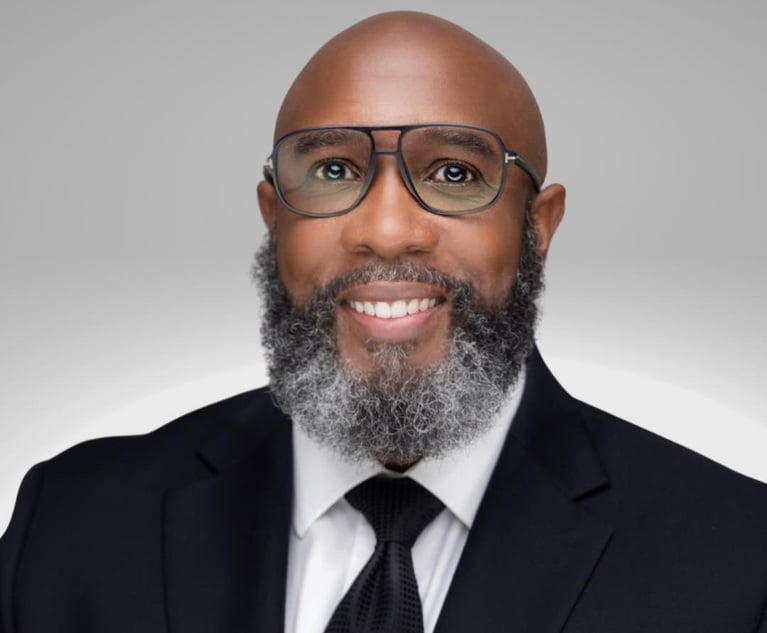What Miami Litigator Reginald Clyne, Son of Civil Rights Activist, Has Learned About Suing and Representing Police
Before Reginald J. Clyne of Quintairos, Prieto, Wood & Boyer in Miami was an accomplished civil litigator, he was the son of the U.S. Department…
July 27, 2020 at 03:11 PM
8 minute read
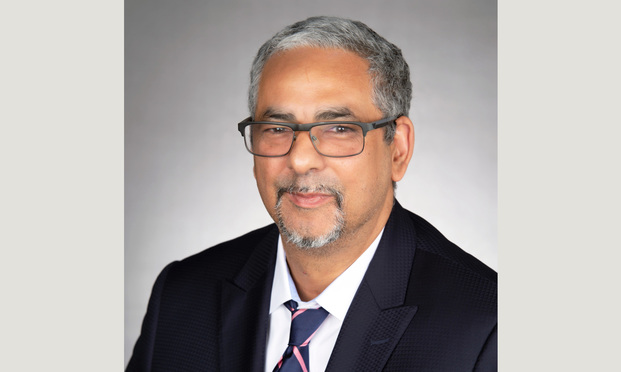 Reginald Clyne of Quintairos Prieto Wood & Boyer in Miami. Courtesy photo.
Reginald Clyne of Quintairos Prieto Wood & Boyer in Miami. Courtesy photo.
Before Reginald J. Clyne of Quintairos, Prieto, Wood & Boyer in Miami was an accomplished civil litigator, he was the son of the U.S. Department of State's first Black attorney.
It was the 1960s, and Clyne's father, like many activists in the civil rights movement, attended protests at segregated restaurants, where they'd sit on lunch counters and ignore racist taunts and abuse from onlookers.
His father's diplomatic job also meant the family were globetrotters — living in countries including Brazil, where Clyne perfected his soccer skills and learned Portuguese; Nigeria, where his mother became a Commonwealth lawyer; and Nicaragua, where the family had to flee its turbulent revolution.
The household was never short of stimulating conversation about politics, religion and world events, so Clyne always came to the dinner table ready to think on his feet.
"If you wanted to be heard, you had to argue, so we all are pretty good arguers," he said.
But it wasn't until Clyne joined the corporate tax department of a large law firm—believing he was too shy for public speaking—that he reluctantly caught the trial bug.
After agreeing to help a senior associate defend a maritime trial, Clyne realized it was exciting quizzing witnesses about the death of a sailor, especially after spending eight months "rewriting the same contract like 50 times."
That spurred a move to Greenberg Traurig's complex litigation department and eventually led to Clyne founding Florida's first Black-owned complex commercial litigation firm, which he ran for 20 years. And his mantra was, "If someone came into my office and broke my heart, I would take on their case."
One day, Clyne heard from Deborah Rice-Lamar, an affirmative action specialist fired from the Fort Lauderdale city manager's office, which she claimed was plagued by rampant discrimination. Rice-Lamar pointed to a former City Hall employee who'd shot and killed himself and five co-workers.
"He, in his suicide note, said it was due to racism at the workplace and he just couldn't take it anymore," Clyne said. "So I ended up representing 50 employees against the city of Fort Lauderdale and had several trials against them."
Those trials were "a turning point" for Clyne because they involved people who had suffered decades of racial discrimination, and resulted in lasting change as the department joined the plaintiffs in suing the city. Cline won all but one, which settled.
Heads rolled, until eventually the city manager, the head of personnel, the head of the utilities department and the general counsel were gone, and Clyne's trial partner, Cynthia Everett, became Fort Lauderdale's first female and first Black city attorney.
"We changed the entire structure of that city, and I'm told it's a lot better for African American employees," Clyne said. "They went from discriminating against Black people to actually hiring them."
Broken system
Civil rights cases are what fuel Clyne's engine, and many stem from racism and police brutality. Among them: lawsuits against Miami Gardens—a city Clyne helped write the charter for.
"It's a majority-Black city, but they had policies that were horribly discriminatory in that the police department was supposed to stop and search every Black male between the age of 15 and 30, regardless of whether they've done anything wrong," Clyne said.
Clyne obtained a $900,000 jury verdict for Wanda Gilbert, a former crime analyst for the city who was fired after she blew the whistle on the policy.
Clyne also represented Michael Asia, a young man chased in 2010 by Miami Gardens police in an unmarked car and later beaten while handcuffed.
"He wasn't resisting, wasn't fighting. They just beat him up, and he ended up being in jail for 30 days because he was too poor to bond out," Clyne said. "After that, he had horrible social and psychiatric trauma. Just hearing a siren would make him go into this huge panic attack."
It's an infuriatingly familiar problem rooted in racism, and most recently evidenced when George Floyd was killed under the knee of a Minneapolis police officer earlier this year. It's also something Clyne worries about.
"My son has dreadlocks, and if he drives through Pinecrest, he gets stopped," Clyne said. "So he now only drives down U.S. 1 and major highways because the police stop him."
Related: Racism, Police Brutality and What Attorneys Can Do: UM Law Hosts Candid Discussion
Asia's case also demonstrated systemic problems within some police departments, as Clyne said "good cops" are often ostracized when they complain about misconduct. In Asia's case, Clyne watched a group of officers turn on the one white officer who spoke up, and although the trial resulted in a $2 million verdict, the officers involved weren't disciplined.
"There are a lot of cases where the police are losing in lawsuits, but the police departments aren't taking any action against them," Clyne said.
But Clyne hasn't just sued police agencies. He's also represented them.
"I see both sides," he said. "There's some great police officers. I also know what police chiefs go through sometimes, when they fire an officer that they want to get off the force and then they get back on through an arbitration because of contract disputes or whatever. So you're trying to clean up your force and sometimes you can't."
That's why Clyne says it's crucial that state attorneys aren't afraid to bring criminal charges against officers. And it's also why he tends to hire a lot of former public defenders, "because they clearly have a heart."
'The guy you forget is a lawyer'
Clyne leads his firm's employment group and toxic torts team and recently secured an $18 million settlement for more than 200 people who claimed contaminated ash from a Fort Lauderdale trash incinerator site gave them or their loved ones cancer.
The litigation presented novel scientific and legal issues. Because although it's well-established that the main contaminants—arsenic and dioxin—are poisonous, Clyne had to prove how a combination of the two causes cancer.
"Where the cigarette litigation is well developed and asbestos litigation is well developed, there weren't many cases with arsenic and dioxin where anybody had sued," he said.
After a 13-year battle, residents have a medical monitoring fund and Clyne's clients will receive compensation.
Clyne has a charisma that juries seem to love, according to his law partner Kimare Dyer, who said he's continually willing to mentor "any and everyone."
"He likes people and it shows," Dyer said. "It makes it easier for people to trust him, it makes it easier for people to put their faith in him, and for him to get his message across and to work through issues that will inevitably come up in cases."
Clyne has mentored more than 20 students over the years, one of whom was Chanelle Artiles, now at Akerman's Miami office. And while Artiles found that many lawyers "want you to feel like they know everything all the time," Clyne wasn't one of them.
"Reggie is the guy that you forget is a lawyer. He's the guy that you want to watch TV with. He's the guy that's going give you a big bear hug if you win something," Artiles said. "So because of that human component, he makes juries feel comfortable. They find him disarming."
He's also a "trial by fire" kind of guy, not averse to nudging Artiles into the middle of a circle of lawyers, saying, "This is my mentee, Chanelle," then walking off.
Clyne feels it was his early foreign adventures that made him a people person.
"I think it broadens your mind when you see other parts of the world," Clyne said. "You learn to quickly adapt to different cultures and different people, so I think that is a skill that I use here now in this multicultural venue with juries."
Reginald J. Clyne
Born: New York
Spouse: Ruth Clyne
Children: Christine, RJ and Harrison
Education: Duke University, J.D. and M.A., 1986; University of Pennsylvania, B.A., 1983
Experience: Quintairos, Prieto, Wood & Boyer P.A. 2015-present; Lydecker Diaz, 2014; Mitchell, Williams & Clyne, Clyne & Associates, Clyne & Self and Clyne & Associates, 1993-2014; George Hartz & Lundeen, 1989-1993; Greenberg Traurig, 1988-1989; Kelley Drye & Warren, 1987-1988.
More profiles:
How Miami Lawyer Corey Lee E-Discovered Himself, And Why You Should Too
Before Jeffrey Epstein's Victims Had a Case, They Had Boies Schiller Veteran Sigrid McCawley
This content has been archived. It is available through our partners, LexisNexis® and Bloomberg Law.
To view this content, please continue to their sites.
Not a Lexis Subscriber?
Subscribe Now
Not a Bloomberg Law Subscriber?
Subscribe Now
NOT FOR REPRINT
© 2025 ALM Global, LLC, All Rights Reserved. Request academic re-use from www.copyright.com. All other uses, submit a request to [email protected]. For more information visit Asset & Logo Licensing.
You Might Like
View All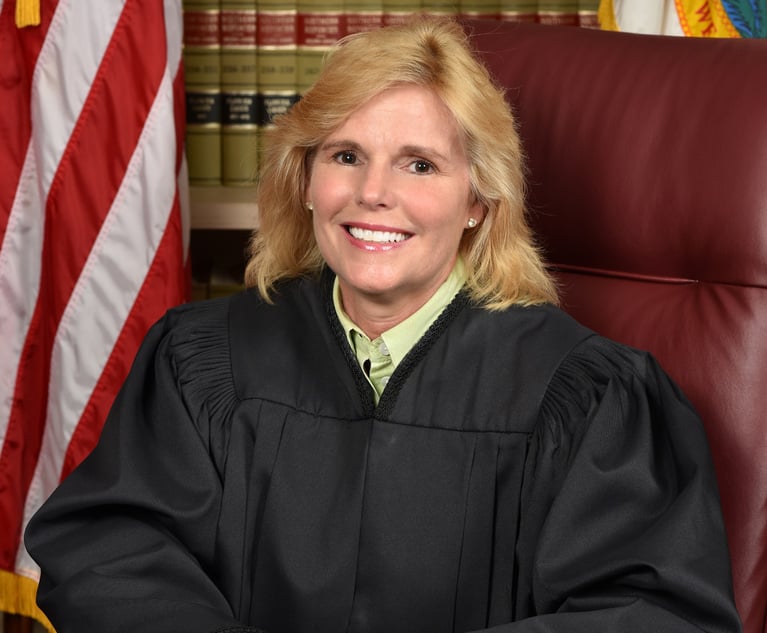
Carol-Lisa Phillips to Rise to Broward Chief Judge as Jack Tuter Weighs Next Move
4 minute read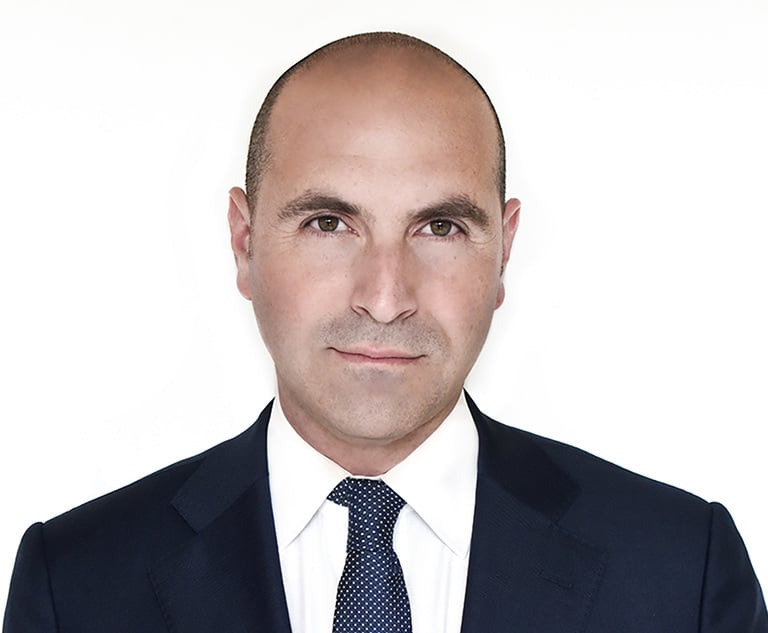
Growing Referral Network, Alternative Fees Have This Ex-Big Law’s Atty’s Bankruptcy Practice Soaring
5 minute read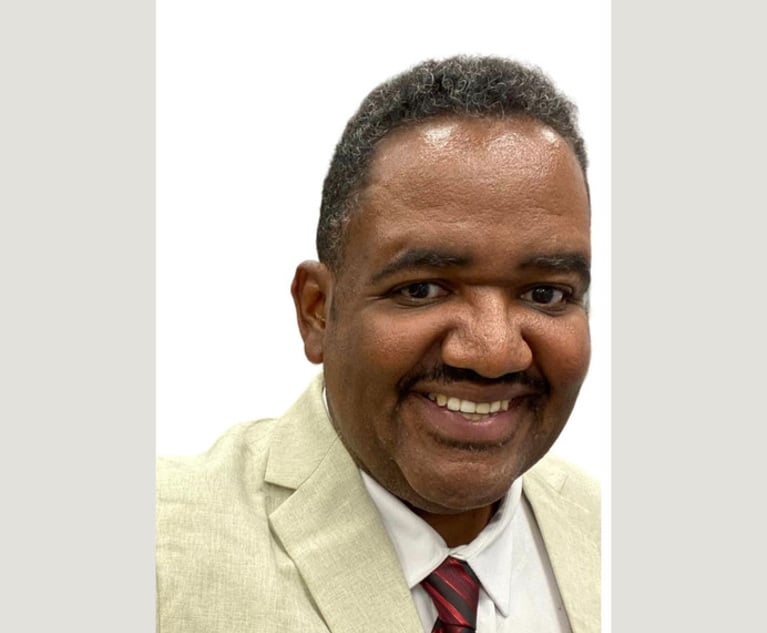
Against the Odds: Voters Elect Woody Clermont to the Broward Judicial Bench
4 minute readLaw Firms Mentioned
Trending Stories
- 1The End of Innocence? DEP’s End Run Around ‘All Appropriate Inquiry’ Spill Act Protections
- 2Pistachio Giant Wonderful Files Trademark Suit Against Canadian Maker of Wonderspread
- 3New York State Authorizes Stand-Alone Business Interruption Insurance Policies
- 4Buyer Beware: Continuity of Coverage in Legal Malpractice Insurance
- 5‘Listen, Listen, Listen’: Some Practice Tips From Judges in the Oakland Federal Courthouse
Who Got The Work
J. Brugh Lower of Gibbons has entered an appearance for industrial equipment supplier Devco Corporation in a pending trademark infringement lawsuit. The suit, accusing the defendant of selling knock-off Graco products, was filed Dec. 18 in New Jersey District Court by Rivkin Radler on behalf of Graco Inc. and Graco Minnesota. The case, assigned to U.S. District Judge Zahid N. Quraishi, is 3:24-cv-11294, Graco Inc. et al v. Devco Corporation.
Who Got The Work
Rebecca Maller-Stein and Kent A. Yalowitz of Arnold & Porter Kaye Scholer have entered their appearances for Hanaco Venture Capital and its executives, Lior Prosor and David Frankel, in a pending securities lawsuit. The action, filed on Dec. 24 in New York Southern District Court by Zell, Aron & Co. on behalf of Goldeneye Advisors, accuses the defendants of negligently and fraudulently managing the plaintiff's $1 million investment. The case, assigned to U.S. District Judge Vernon S. Broderick, is 1:24-cv-09918, Goldeneye Advisors, LLC v. Hanaco Venture Capital, Ltd. et al.
Who Got The Work
Attorneys from A&O Shearman has stepped in as defense counsel for Toronto-Dominion Bank and other defendants in a pending securities class action. The suit, filed Dec. 11 in New York Southern District Court by Bleichmar Fonti & Auld, accuses the defendants of concealing the bank's 'pervasive' deficiencies in regards to its compliance with the Bank Secrecy Act and the quality of its anti-money laundering controls. The case, assigned to U.S. District Judge Arun Subramanian, is 1:24-cv-09445, Gonzalez v. The Toronto-Dominion Bank et al.
Who Got The Work
Crown Castle International, a Pennsylvania company providing shared communications infrastructure, has turned to Luke D. Wolf of Gordon Rees Scully Mansukhani to fend off a pending breach-of-contract lawsuit. The court action, filed Nov. 25 in Michigan Eastern District Court by Hooper Hathaway PC on behalf of The Town Residences LLC, accuses Crown Castle of failing to transfer approximately $30,000 in utility payments from T-Mobile in breach of a roof-top lease and assignment agreement. The case, assigned to U.S. District Judge Susan K. Declercq, is 2:24-cv-13131, The Town Residences LLC v. T-Mobile US, Inc. et al.
Who Got The Work
Wilfred P. Coronato and Daniel M. Schwartz of McCarter & English have stepped in as defense counsel to Electrolux Home Products Inc. in a pending product liability lawsuit. The court action, filed Nov. 26 in New York Eastern District Court by Poulos Lopiccolo PC and Nagel Rice LLP on behalf of David Stern, alleges that the defendant's refrigerators’ drawers and shelving repeatedly break and fall apart within months after purchase. The case, assigned to U.S. District Judge Joan M. Azrack, is 2:24-cv-08204, Stern v. Electrolux Home Products, Inc.
Featured Firms
Law Offices of Gary Martin Hays & Associates, P.C.
(470) 294-1674
Law Offices of Mark E. Salomone
(857) 444-6468
Smith & Hassler
(713) 739-1250





